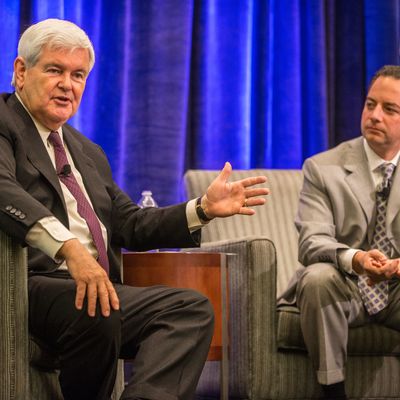
Former House Speaker Newt Gingrich led Republicans into their last shutdown standoff, vowing to keep large parts of the federal government closed unless Bill Clinton agreed to a balanced budget in seven years. Clinton won that battle, although Gingrich has long insisted that he has prevailed in the war.
Earlier this week, we called Gingrich and former House Majority Leader Dick Armey to get their thoughts on the current shutdown and its parallels to their own standoff with a Democratic president. (Gingrich-era House Majority Whip Tom DeLay did not respond to our interview request.) Gingrich — now a co-host of CNN’s revived Clinton-era staple Crossfire — discussed where he went wrong, what he’d do if he were John Boehner, and why he misses Bill Clinton in the White House.
Speaker Boehner has come under fire for failing to control his own conference. How was it different in your case?
At the beginning of the process, I had more prestige. I was seen as the guy who had led us out of the wilderness after 40 years, and, at least in the opening year or two, I had a lot of willingness to accept my judgment. There’s now a mythology that I had dramatically more control than John does, but if you go back and read the contemporary coverage, they were convinced that I was being pushed by my conference as much as people today are fully convinced he is being pushed. Frankly, the Senate and the House are really complicated. The White House is simple. You get one guy who gets elected, and he hires everybody else. When the president calls a Cabinet meeting, they all say, “Yes.” In the House and the Senate, you have 535 people, all of whom won their own election, and they walk in the room, and they go, “Look, I gotmy own opinion here.”
And once you decided to end the shutdown, some of those 535 weren’t very happy with you.
Dole reached the conclusion that we couldn’t get further, and I had the belief that we could not sustain what we were doing while being isolated from the Republican Senate. Now we had a very large bloc, 60 or 70 freshmen, who didn’t agree with that. And that’s just reality.
But you got most of them to vote with you anyway.
Yeah, we were still on our honeymoon. But, gradually everybody reverts to a norm. And the norm for the House is to be very hard to manage.
Dick Armey told me you were convinced that Clinton would be blamed for the shutdown. Do you now agree you were wrong about who would take the heat?
Yes. It was actually a miscalculation on my part for a very ironic reason: In retrospect, the party which is seen as dominant is the most blamed for a shutdown. In the experiences we’d had with George H.W. Bush and Ronald Reagan, the shutdowns had worked against the president, because the president was seen as dominant. In the fall of ’95, we were seen as dominant. So we bore more of the responsibility.
When you agreed to lift the shutdown, did it feel like a stinging defeat?
It didn’t. Look, I was a student of Margaret Thatcher. And Thatcher went through a year-long fight with the labor unions in 1984 that involved, in fact, almost the equivalent of a civil war. I thought we were in a situation where things were getting out of control, and so many had to have the courage to stand in the breach and try to make things functionally work again.
I would also argue, and there’s a pretty impressive piece by Nate Silver on this, there’s no evidence that the shutdown cost us anything politically over time. We kept control of the House and we gained two seats in the Senate. You have to make an argument that we were going to win the presidency, which frankly I don’t believe. What we did gain was a dramatic increase in Clinton’s respect for us as serious partners in legislating, and we gained an ability to negotiate with a seriousness very few presidents give the legislative branch.
If you were in Speaker Boehner’s shoes, how would you get out of this?
I think that they have to be prepared to hang tough until they get some concession from the president. I think for them to cave without getting this president to concede something would be a disaster of historic proportions, because it would signal to this president that he can ignore and run over the Congress and that there’s no consequence.
Would you insist on Obamacare being part of that?
I’m kind of amazed that out of 2,700 pages of Obamacare, the president can’t find anything to offer as a possible modification. You know, you don’t have to agree to everything. You have to say, you know, “I could accept this; I can’t accept that.” But to start by saying “I can’t accept anything” makes it really hard to get to an agreement.
And you felt like you had room to negotiate with Clinton?
Clinton had been governor for twelve years; he understood legislatures; he had a personality that naturally invited conversation. We talked all the way through the shutdown. I think that, faced with something like Obama, you have to just design a totally different strategy, because he’s a very aloof, almost imperial personality. I can’t imagine picking up the phone with Bill Clinton and having his opening words be: “I will not negotiate with you.”
It almost sounds like Newt Gingrich is nostalgic for Bill Clinton.
Well, nostalgia might be a bit strong.





























